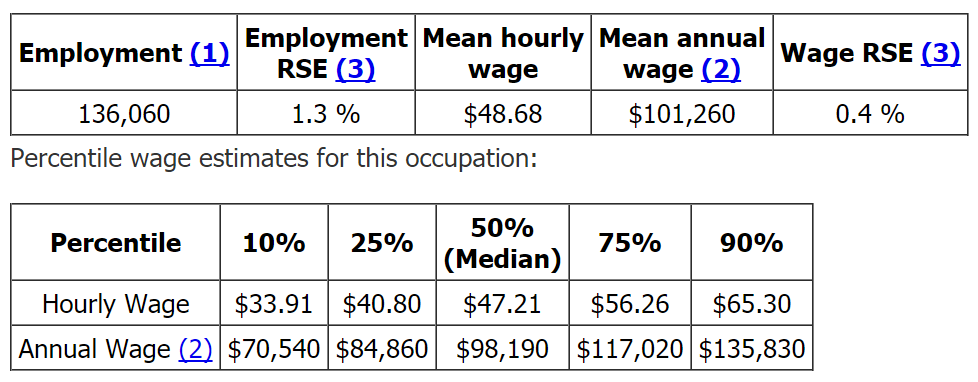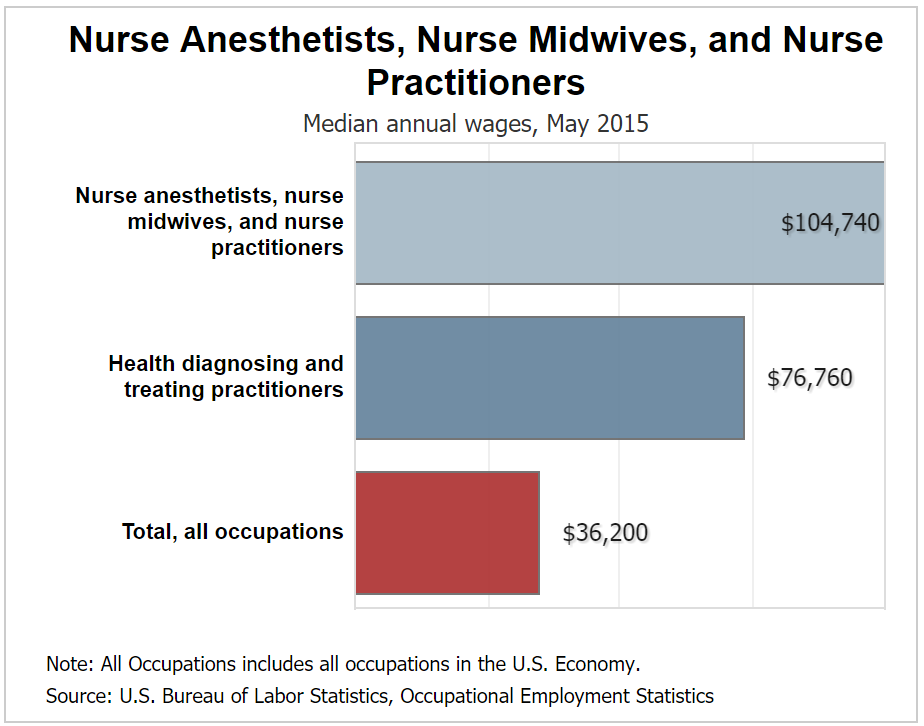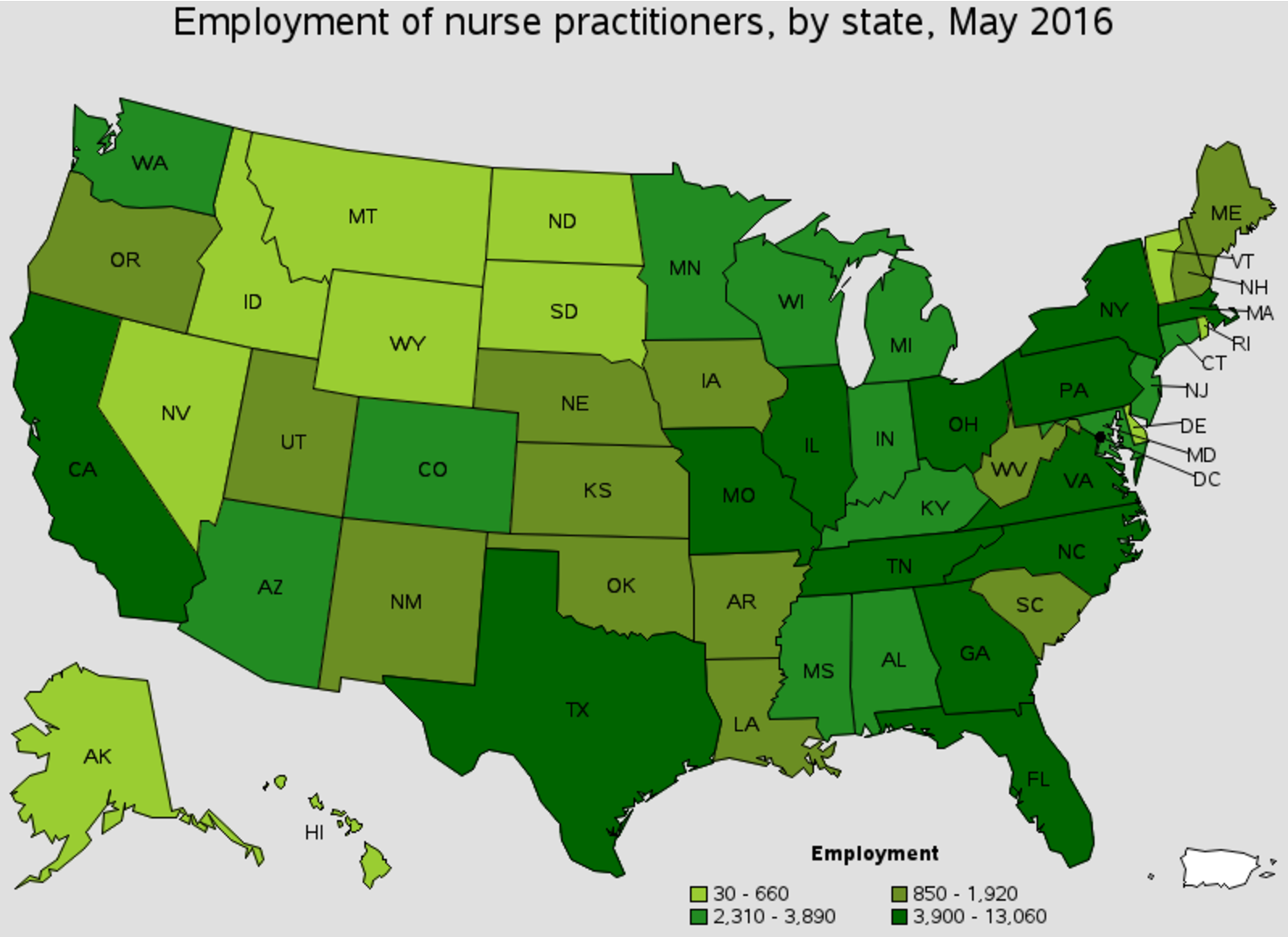While choosing a career, it is imperative that we know the exact job. The same could be said in the medical field, where different jobs could be mistaken for others. A Nurse Practitioner is also called an Advanced Practice Registered Nurse (APRN). They have duties that nurses cannot do. NPs have different work depending on the field they specialize on. The rest of the article will show you the specializations and general work duties of these professionals.

Table Of Contents:
- Nurse Practitioner Salary
- Nurse Practitioner Employment Outlook
- How To Become A Nurse Practitioner
- Nurse Practitioner Job Description
How Much Salary Does A Nurse Practitioner Get In Central?
A nurse practitioner receives an average of $90,000. RNs receive $65,000 on average, which means they earn less than NPs. This is because the training of NPs are more extensive, allowing them to earn a medical practitioner title.
[asd_program_button /]Location
NPs receive higher salaries if they are badly needed in the area. For instance, Hawaii pays $115,000 annually to NPs, which makes them the highest paying state. This is about 30% percent more than the national average. While Delaware offers something around $67,000.

Years of Experience
Salary increase in this field is rare even for those who have extensive experience. It increases about 10-15% over 20 years of experience.
Skills
An increase of salary may be given if you have more expertise in some fields. An approximate salary of $99,000 could be given to those with skills in acute care and emergency room skills. Those who have family care skills can earn up to $92,000. Those who earn somewhere in between are mostly geriatrics and internal medicine practitioners.
Work Promotions
The only real way to increase your salary in this line of work is to get promoted or get specialized. There are a few processes you can follow to achieve this. You can try to become a Nurse Practitioner Anesthetist who can earn about $150,000 a year. Another is by becoming an Advanced Registered Nurse Practitioner, who earns slightly more than the regular NP. Other options include being a Family, Pediatric NP, Psychiatrist NP, or an Adult NP. Besides taking these courses, you could earn more by taking other specialization courses. The specific area you take may require you to spend a period of time to apply what you learned and you will receive certificates in return.
Assistance
An NP is entitled to numerous benefits. These include paid vacations, retirement planning and health insurance. Most of the time, the company gives back the amount of money spent on further schooling that enhances their abilities. Learning skills is a big matter, which is why they are given money and registration fees to participate in conferences that improve their abilities.
Since primary medical personnel is short in numbers, the demand for mid-level medical care professionals may increase. So, in the future, there is a high chance that Nurse Practitioners are going to get paid much more. As an NP you are also given more time and freedom to choose which cases to work on.

The Status of Nurse Practitioner Employment In Central
In 2014, the United States of America provided 170,000 jobs to nurse practitioners. Over the next decade, the BLS expects approximately 31% development in the field. During that time, as much as 57,000 jobs will be available. The main reason for this is the shortage of medical workers. The need for doctors and physicians cannot be catered by the number of medical professionals. Thus, the need of people like PAs and NPs is increasing and is projected to increase even further. There is an expected 11% increase in jobs for Family, Pediatric, Gastroenterology, and Hospitalist NPs while jobs for neonatal NPs will have a 34% increase. This is way above the average growth rate of other careers.
[asd_program_button /]The best way to deal with people in the medical field is to use the patient-centered approach, which is a much ideal process than only focusing on the illness. Nurses perform these tasks, that’s why they are needed. It is the reason why NPs are preferred over PAs.
The need for healthcare in rural areas is also increasing. NPs are the best medical professionals in these areas because establishments are impossible to build there. These professionals work hand in hand with physicans to provide medical assistance to the patients in such areas. The biggest employers of NPs are Office of Physicians, Outpatient Care Centers, and General Hospitals.
Specialized health care demands are rapidly increasing. Specializations of nurses include those in pediatrics, gerontology, acute care, and other fields. The diagnosis of the illness is clearer and faster when the disease is specialized by the practitioner.

Another need for nurses is coming up in education. Medical schools have a shortage of teachers for nurses and medical professionals. A Ph.D. title is needed before a nurse practitioner becomes a teacher in the field. After spending much time with work, most people go for teaching jobs. This choice is made by NPs who feel that the regular work in the medical field has already worn them.
There is a brighter future for nurse practitioners in terms of earnings. The salary of a nurse practitioner is expected to grow about 19% by 2020 because of above reasons. In the field of teaching, nurse practitioners may get as much as $85,000. This can go up to $175,000 a year easily with experience. The specialization of a nurse determines the amount of salary he or she earns. The earnings of a nurse anesthetist could range from $150,000 to $235,000.
The state you live in has a say on the job standpoint and salary of each career. For more statistics and data on the job outlook of NPs, you can visit Bureau of Labor Statistics. As you can see, this is a highly competitive job with great prospects.

Career Requirements For Nurse Practitioners In Central
How to Be A Registered Nurse
One should strive to become a registered nurse first. To do this you must earn a bachelor’s or an associate’s degree from any of the registered institutions. A diploma can work as well. However, the skill acquired during internship or work experience are more important. You can get this experience through an associate’s degree or a bachelor’s degree. Taking and passing the standardized national exam for RNs is your next step so you can work officially. Another option is to become a Licensed Practical Nurse first.
[asd_program_button /]Earning Bachelor’s Degree
It is also recommended that one completes his/her Bachelor’s Degree. This is mostly for people who had earlier applied for a diploma or an associate’s degree. A Bachelor of Science in Nursing (BSN) is required. Besides the comprehensive learning of medical procedures, there is also application during internship clinic rounds. One’s experience in the field contributes a lot to the career of a medical professional. You may be a bachelor’s degree holder already and going for a Registered Nurse career at the same time. In such cases, there are bridge programs from RN-BSN. The time duration of these programs varies. The duration is longer when you are also studying while working. There are also bridge courses from LPN-BSN.
Years of Practice
The medical field treats experience as a great factor. Getting a master’s degree after a bachelor’s degree might be the most efficient way of becoming an NP. However, many people already in the profession feel that this leaves you inadequately trained for the situations that you might face in life. Thus, they recommend you go through some training before applying for a graduate degree since some of the NP training programs also require you to have some prior experience. During the training, you will learn how to work effectively as an individual and with other professionals, how to ensure the welfare of various patients and treat the infections they may have.
Earning a Master’s Degree
A requisite of becoming a Nurse Practitioner is one’s Master of Science in Nursing (MSN) degree. Many programs accept RNs with a diploma or an associate’s degree. Other programs require the students to have a bachelor’s degree. Either way, the master’s degree includes spending time in both the classroom and the clinic. Extensive work experience is required for an RN before they turn into NPs. You might also try to get a Doctor of Nursing Practice (DNP) degree as an alternative.
[asd_program_search_bar /]Earning A Ph.D. Title
The Ph.D. title follows after the master’s degree and in this program, one can opt for the specialization that best fits him/her. Reaching this far will potentially increase your earnings and also your reputation as a medical professional. You can choose to specialize in fields like family care, gerontology or health systems.
State License and Other Documents
An NP must be licensed by the state. Requirements for licensing may vary in every state. They publish a list of accepted programs and bachelor’s degree. To become a nurse practitioner, it is important for every candidate to have a valid RN license, a master’s degree in nursing and to pass the state licensure exam. The licensure exam differs depending on the specialization you are choosing. You can pass your application and requirements in any establishments under the American Nurses Association such as the Pediatric Nursing Certification Board.
In summary, becoming a registered nurse requires you an associate’s degree or a diploma. Then, you need to earn a bachelor’s degree, which will expose you to real life medical situations. Lastly, you will get a master’s degree in your chosen area of specialization and the license will follow.
What Work Is Done by A Central Nurse Practitioner?
General duties
Physicians and other medical professionals of the same level supervise nurse practitioners. They can diagnose and treat patients like a primary healthcare provider. If patients need to undergo medical tests and other proceedings, they can are also allowed to conduct them. They can handle patient consultations and also interpret test results. Sometimes, they are also allowed to assist a physician in surgery whether as the surgeon or an anesthetist. They could also handle high risk surgeries.
[asd_program_button /]A more patient-centered treatment approach is done by nurse practitioners. This means that they focus more on the patients’ needs and wants while treating them. Most usual advises include prevention because they want to keep their patients away from diseases before they occur. This means that part of the NPs job is to discuss prevention of injuries and diseases to their patients.
Before the licensure exam, a nurse practitioner is generally required to complete a specialization program. The specific duties of an NP depend on this specialization that they have chosen. Here are the most common duties they do.
NPs for Families
These NPs take care of the whole family. Through the assistance of NPs, the whole family can avoid illnesses together, and any disease no matter how how old the patient is could be treated. They also provide direct care to the family in collaboration with a physician.
NPs Specializing in Psychiatry
Psychiatric nurse practitioners work with a group of people who have mental issues. These professionals can prescribe medicine and do therapeutic consultations with them. However, they are not allowed to perform psychological testing. In this case, they can work with a professional psychologist to come up with a treatment program base on the results.
Working As Pediatric NP
Newborn to 18 year old patients are handled by pediatric NPs. Under this specialty is the neonatal NP. People you see inside Neonatal Intensive Care Units (NICUs) caring for newborn babies work in this field. Kids can have a smoother puberty process through the help of pediatric NPs. They are also responsible for immunizations.
Working as a Gerontology NP
Those specializing as nurse practitioners in gerontology will be dealing with medical problems of elderlies. Illnesses are treated and prevented with the help of these practitioners by giving their patients some advice. Old people are more prone to different diseases. These healthcare experts will help reduce the risks of other diseases. Most patients who could only live for a certain period are kept healthy by these professionals using fitness programs.
The mentioned are only few of the specializations a nurse practitioner have. There are several others that an NP might try to get into according to his or her own interests. Different specializations may have variations in salaries. The Certified Registered Nurse Anesthetis (CRNA) is included in the list of highest paid specializations . After learning these work descriptions for your future career, you may now be able to choose the ideal path for you.
[asd_program_prefilter_box /]